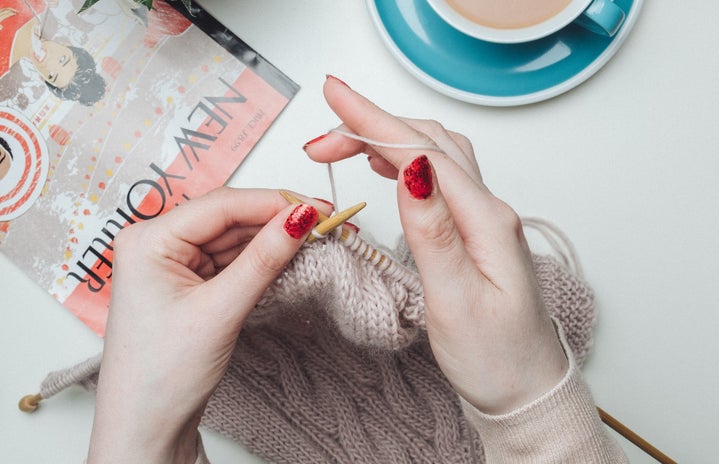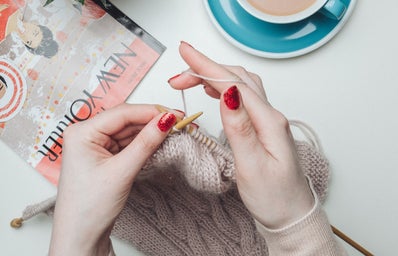I began knitting when I was around 14, my mum had just taken it up and it slowly became a collective hobby for my siblings and me. We would often sit around in the living room, watching TV and staring intently at our knitting, often not saying a word until someone messed up and had to start all over again (this was usually me). Although I did not actively pursue knitting for my anxiety, I have come to realise over the years how much it has positively impacted my mental health.
I would like to preface that while knitting has been personally beneficial for my mental health, it may not suit everyone and is simply an activity that only goes some way at helping mental health difficulties. If you are suffering with mental health, it is important to find someone who can help you, whether this be with medication or therapy.
While I try not to sound too much like a boomer, I can recognise the detrimental impacts technology can have on your mental state. For me, when I felt depressed or anxious, my phone was the first place you would find me. I would scroll for hours aimlessly without stopping. I found that this was the perfect place to disassociate. It wasn’t until I realised how much of a detriment this was having to me, as I found myself cycling through anxious thoughts which never seemed to have an end. The immersive quality of knitting can help tackle this dependence on your phone and serves to be extremely therapeutic. I still often find myself knitting for hours, so intent on finishing a project that I barely have time to check my phone.
While knitting is great at getting you off your phone, it also has many other positive impacts. Most notably, it can contribute to serotonin release, which helps regulate anxiety and depression. In a study conducted by Harvard’s Medical School’s Mind and Body Institute, it was also found that knitting lowers the heart rate by an average of 11 beats per minute.
It is unsurprising that the repetitive nature of knitting can be so calming both physically and mentally. I would almost define the process to be hypnotic in this sense. If you ever suffer with intrusive thoughts like me, it can be difficult to break the cycle. I find that knitting has greatly aided me in this way, it can stop the repetitive thought patterns by distracting your mind.
The social aspect of knitting is also undeniably beneficial for your mental health. There are rarely times I feel calmer than when I am knitting with family. In 2013, The British Journal of Occupational Therapy conducted a study on the benefits of knitting in relation to personal and social wellbeing and found that those knitting in a group ‘impacted significantly on perceived happiness, improved social contact and communication with others’. If you are simply feeling lonely, knitting is a great way to bond with other people. If you are looking to learn to knit and would like to do this in a group, the UCL knitting society offers social events where students are able to pick up the skill while socialising with new people.
I think that a lot of people are put off by things that look too difficult off the bat and I definitely relate to this. There is a frustration at not being able to master a skill when you’re a beginner but from my own experience, it’s worth sticking it out. Not only is the process of knitting beneficial but the ability to create usable items is unbelievably satisfying, and it makes it evermore worth it in the long run.
So, what are you waiting for? I have attached two free knitting patterns below for beginners so you can begin your knitting journey!
Basic Scarf:
Basic Hat:


